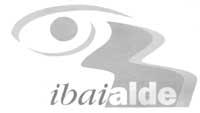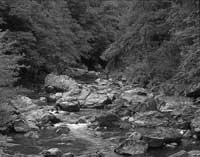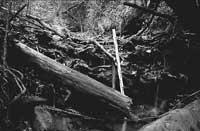Knowing our rivers, ibaialde
1996/04/01 Kaltzada, Pili - Elhuyar Zientziaren Komunikazioa Iturria: Elhuyar aldizkaria
zone zone zone zone zone zone zone zone zone
The Ibai alde program starts for the first time this year. He has already taken his first steps and those interested in participating in this event have already manifested their intention. Shortly the material will be distributed in the groups and a question turn will be opened. Before all this, we wanted to know in more detail the program Ibai alde and to know it, we have asked everywhere.
Origin of the program

The main objective of this program is to promote knowledge and protection of rivers. If we look at the study and the methodology of analysis, we find that it has a lot to do with the AZTERKOSTA program, and that is. The project that took place for the first time in Ireland has paid off.
As for the Basque Country, AZTERKOSTA is organized by CEIDA (Center for Environmental Education), the Department of Stratigraphy and Paleontology of the UPV/EHU and the Nature Group of Zumaia. In response to some surveys, each group assumes responsibility for a coastal section and analyzes the machine from various aspects. These data are collected below in the activity report and are organized for use in schools. Year after year, AZTERKOSTA has achieved more and more echo and the viability of the model is now fully confirmed.
On this occasion they have been based on the same model to structure the Ibaialde project. Instead of the coast, the objective of the program is to study in detail the rivers and valleys. There also reader, because there is a lot to learn.
Why the rivers?
The rivers are spectacular and fascinating places. In rivers, like water, life flows by feeding on a new life. Plants, animals and human beings, without water we are nothing and could hardly develop a more prosperous source of life. Our society, that is, we ourselves, use rivers and valleys to advance our daily lives; both in the home and in the workshops, rivers have been and are today one of the fundamental pillars of development, although we are often not aware of it.
However, the degradation does not forgive and the rivers also suffer the burden of pollution. We add to the earth chemicals that, for example, will be transported through the rivers when it rains. Hundreds of pollutants are emitted and many plant and animal species are sometimes punished until their destruction.
In addition, we adapt the valleys to our needs and, modifying the natural route, we crush the margins of the rivers. We filled with garbage. To put it in prose, the admiration that is to be given to them becomes neglect.
Are not all these reasons enough to start worrying about this serious situation? In this sense, those responsible for the Ibaialde program are in the approval phase, and thus, the axis of the project is a better knowledge of rivers and valleys. It is very different how you can direct all this.
All study

As mentioned above, the main objective of the program is to know and make known rivers and valleys. The Ibai alde project is aimed at anyone who approaches this intention. Likewise, it can be understood that it can also be understood as a performance in the educational field, which logically opens even more the scope of the project. In short, the Ibaialde program is suitable for schools, both for primary and secondary schools, as well as for those who attend the high school level, as well as for sports clubs and cultural groups. And the ecological groups?
Without a doubt, they can play an important role in the development of the program and so the organizers recognize it when they specifically address these groups. In fact, ecological groups have extensive experience in these tasks and the exchange of experiences can be enriching for everyone. It is suitable to complete the program of action of the groups in the fluvial zones, as for example in the case of precipitation or fluvial cleaning, studies and denunciations of discharges.
Steps of the study
As discussed above, the structure of the Ibai Alde project will be known to those who have already participated in AZTERKOSTA, since the same methodology will be used.
The rivers will be divided into five kilometers and each group will be responsible for one of them. The collection of data and samples will take place in May. Thus, numerous exits will be made to the rivers of the Autonomous Community of the Basque Country and, according to the criteria provided by the organization, the groups must complete a survey. This study will be carried out in different areas, such as the structure of the rivers, the distribution of the inhabitants, the risks, the types of pollution, the current use, etc.
Practical work will include samples and direct observations. To carry out all this, participants must be provided with materials, of which the organizers will be responsible: data collection sheets observed and collected, instrumental material for the taking of samples and auxiliary material, books guides of animals and trees, summaries of the quality of the waters, etc. will be delivered.
In the next step, the classification and structuring of the collected information will be carried out. With all this, the report of the Ibaialde program will be completed, which will be distributed to all participants and those involved in river management (City Councils, Councils or companies related to rivers).
This is the new opportunity to act responsibly knowing our rivers. It achieves the repercussion needed by the project and continues it forward.
Who is who in the project?The Ibaialde project has been promoted by the Department of Land Planning, Housing and Environment of the Basque Government. In addition to the design, organization and implementation of the project, three teams have been commissioned, one by province. ARABA LURKOI S.C.L. Saint Lucia, 1. Telephone Leorza-Maeztu 945-410032 Nº Fax 945-410246 C.T. GIPUZKOA IBIUR Letxuga, 8. Tolosa Telephone 943-100723 Fax number 943-674552 BIZKAIA ORTZADAR S.L. Avenida J.A.Zunzunegi, 5. Telephone Bilbao 94-4277917 Nº Fax 94-4278851 |

Gai honi buruzko eduki gehiago
Elhuyarrek garatutako teknologia




